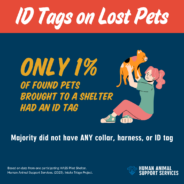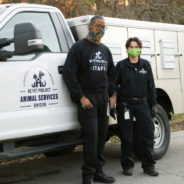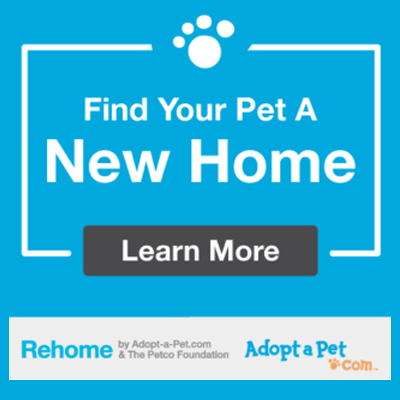Triage that Transforms Intake
[embedded content] Seeking new techniques to improve the way increased intake is managed? Amanda Foster, HASS Programs Director, discusses strategies you can use to better understand the “why” behind animals entering the shelter, address immediate pet support needs, and easily connect people with social service resources to aid in avoiding unnecessary intake all together. Source: Human Animal Support...
Lost Pets, Found Faster
[embedded content] Every year, countless pets go missing, but how effective are our current reunification efforts? This webinar explores solutions to improve lost pet reunification rates and keep lost pets out of kennels. Join us March 13th at 1pm/CST as Ashley Shrewsbury, Pet Reunification Specialist at Charlotte-Mecklenburg Animal Care & Control as well as Gina Botticello, Community Partnerships and Programs Manager at PASCO County Animal Services, discuss insights into making reunification faster, easier, and more effective Source:...
HASS Embarks on Clearing More Kennels by Launching the “MAP” project: the Modern Adoption Process
The project seeks to simplify the complicated adoption journey through customer care services, encouraging families seeking pets to adopt instead of shop (AUSTIN, TX) February 26, 2025–Human Animal Support Services (HASS), an international project bridging the gap between human and animal welfare, today launches the Modern Adoption Process (MAP) project. MAP will address functional challenges of the adoption journey by implementing strategies from for-profit business models. The emphasis will be on fostering connections, meeting...
Intake to Impact: Creating Efficient Pathways to Placement
[embedded content] Across the country, animal shelters continue to face many challenges in turning animal intake into successful placements. With a united goal being to save lives and support both people and pets in need, Spencer Conovor, Assistant Director of HASS pilot shelter Pasco County Animal Services, speaks in this webinar about how to develop a productive pathway to increasing placements and improving intake. Source: Human Animal Support...
NEW Human Commonalities Project Launched by Human Animal Support Services (HASS)
The project aims to connect participating animal welfare organizations with human welfare organizations to address the common social service needs in their communities, together (AUSTIN, TX) February 6, 2025–Human Animal Support Services (HASS), an international project bridging the gap between human and animal welfare, officially launched the Human Commonalities Project (HCP). Knowing that 98% of pet owners agree that pets are family, this project’s goal is to identify the commonalities between people interacting with the animal...
HASS Announces Key Findings and New Resources Developed through the Intake Triage Project
A project dedicated to understanding the root causes behind why people need support, why pets enter the shelter, and how the industry can utilize resources to help more people and their pets. (AUSTIN, TX) January 23, 2025–Human Animal Support Services (HASS), an international project bridging the gap between human and animal welfare, is proudly sharing the preliminary results from its Intake Triage Project (ITP) initiative. Facilitated in collaboration with three HASS pilot shelters, ITP aimed to help animal welfare organizations...
2025: Overcoming Sheltering Setbacks
[embedded content] In an environment where overcrowded kennels, limited funding and people in desperate need of pet support services are the norm, HASS is inviting you to be a part of the solution to issues like these 2025! In this webinar, Lee Ann Shenefiel, program director for the Hays County Pet Resource Center, will share proven research, programming and free resources for your organization to unite with HASS in changing animal welfare industry setbacks to successes. Resources Mentioned: Source: Human Animal Support...
Insights from the Field
Shelters with High Return-to-Home Rates for Dogs While many animal shelters continue to face challenges in successfully reuniting lost pets with their owners, some have developed innovative strategies and are making significant strides in this crucial area. With current trends in technology, data sharing, and community outreach, many shelters are achieving impressive return-to-home rates. British Columbia SPCA and HASS Partner Organization, Wisconsin Humane Society, are two shelters who are achieving dog return-to-home rates as high as 80% by...
Human Animal Support Services (HASS) Announces New Field Services Toolkits to be Included within HASS Playbook
The new resources were developed in partnership with NACA and other field services experts to create a united standard of care (AUSTIN, TX) December 10, 2024–Human Animal Support Services (HASS), an international project bridging the gap between human and animal welfare, announced today the inclusion of 11 new toolkits to the HASS Playbook. Developed in partnership with the National Animal Care Association (NACA) and other animal welfare industry experts within field services, the new resources aim to provide shelters with...
Human Animal Support Services (HASS) Announces Elkie Wills as Director
(AUSTIN, TX) December 9, 2024–Human Animal Support Services (HASS), an international project bridging the gap between human and animal welfare, announces Elkie Wills as Maddie’s® Director of Human Animal Support Services, bringing more than 20 years of animal welfare and community engagement experience to the project. Launched in 2020, HASS will reemphasize its commitment to supporting people and their pets under Elkie’s direction and continue to work with pilot and partner organizations to implement data-driven,...

























